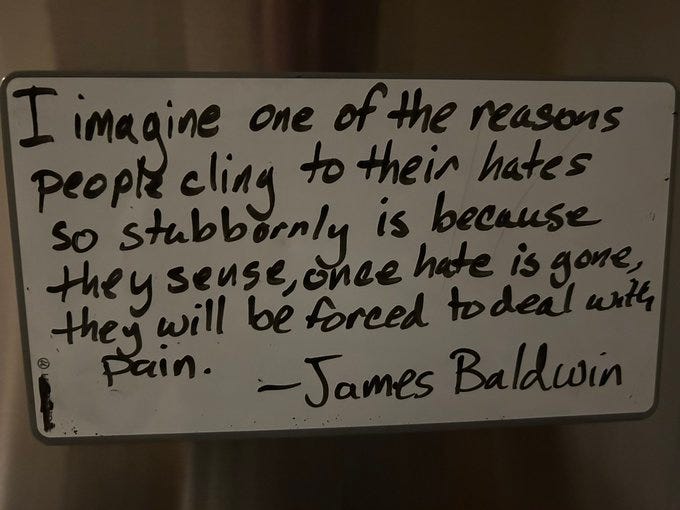Fridge Philosophy: Seeking Understanding in Divisive Times
How Fear, Perception, and Empathy Shape Our Interactions and Relationships
As much as I try to keep the Salted Wetzel "Politics Free," current events are often drawn into every conversation. I see this more than ever as we become more divided and cannot understand the person standing across from us.
We are the heroes of our own stories. We see our world through the lenses of perceptions based on our experience, education, moral outlook, relationships, and more. These perceptions fuel our narrative of our lives played out in front of us., and when they clash with the other realities we see, uncertainty leads to fear.
Fear manifests in so many ways—fight or flight are the most primal reactions. We can get angry and gear up to take action. We can also become dejected and apathetic. Others can manipulate these emotions to move us (both good and bad) toward these outcomes.
Last month, in Scientific American's article, "Why the News Feels Overwhelming—And How to Cope," Megan Bartels talked to several psychologists about the overwhelming uncertainty 2025 has brought (and we're not even to April). We are subject to cognitive distortions when we are uncertain, fearful, and overwhelmed. We grasp for anything reinforcing our fears, including groups of people with the same concerns, anger, and frustrations. It leads to an us vs. them separation, which leads to more polarization and fear.
When people who we think of as on our team are outraged and upset and anxious, the natural and adaptive response is for us to have the contagion of their experience. —Dannagal Young, a professor of communication at the University of Delaware.
And because our fear has already reduced our cognitive abilities, we're also more likely to instantly take on someone else's view of the world without examining it for ourselves. —Arash Javanbakht, a psychiatrist and a neuroscientist at Wayne State University.
James Baldwin (1924 – 1987) was an African-American writer and civil rights activist who garnered acclaim for his essays, novels, plays, and poems. Baldwin's fiction posed fundamental personal questions and dilemmas amid complex social and psychological pressures. He focused on themes of masculinity, sexuality, race, and class that often intertwined with characters navigating internal and external obstacles in their search for self- and social acceptance. (Wikipedia) Baldwin was unapologetic about his views on race and shared it was his purpose and right to be critical of American race relations during the 1960s.
I often seek out Baldwin's writings when I want to be challenged. Our life experiences are incomparable. Yet, he is such a tremendous writer who cuts through those contrasts to allow me to see his truth and point of view, broadening my perspectives.
When we seek to understand, we find that our differences are slight. We have joys and loves. We have similar fears, but they manifest themselves in varying ways. Those manifestations require distinct comforts that then drive us to opposing conclusions. We can be manipulated to be sworn enemies, but when we peel back our onions, we are seeking the same thing - dignity, safety, and prosperity.
One of the first times I heard "Seek to Understand" in an intentional way for professional development was through the Seven Habits of Highly Effective People by Steven Covey. The principle of listening is one of the most underrated aspects of effectiveness. So often, particularly on social media, we aren't looking to understand people. We seek ways to respond or "own" the other side. But what happens? Nobody's mind is changed. There is only an argument without understanding. Yet, if we lean into curiosity and look at their point of view, we may disagree, but we may understand.
Understanding leads to empathy and points us toward forgiveness. Sometimes, it feels so right to hold on to our grievances. Fear and anger give us power. They provide us with some kind of confidence to hold onto when we are hanging off of a cliff. Forgiveness, however, benefits us more than the ones we forgive. When we forgive, we remove the tight grip fear and anger have on us and allow us to move forward.
Baldwin often embraced the dichotomy of considering multiple points of view while remaining strong in one's convictions. He said, "We can disagree and still love each other unless your disagreement is rooted in my oppression and denial of my humanity and right to exist."
Unfortunately, when someone refuses to reciprocate empathy, doesn't seek to understand, and can't acknowledge the pain they cause, we often are faced with a decision to focus on productive relationships. We all have our lines in the sand and what drama we can take. We can forgive, but we don't have to forget.
Instead, we can focus on those close to us who bring us joy, life, and love. In these crazy times when we seem to be breaking up with friends over politics, we first seek to understand and find common ground. Be curious. Sometimes, those similarities will be the tether that brings you together.
Side of Mustard
I’ve been receiving positive feedback on my crime fiction serial, Capitol Rookie. We are three parts in with eight parts left to go. Start here and catch up!
The year is 2004. Young reporter Alex Shelby is four months into his stint at the Sacramento Tribune. Struggling to cultivate sources, he gets a scoop that leads to political scandal. Each chapter unravels a web of deceit, danger, and betrayal in a gripping tale of investigative journalism. Don’t miss this thrilling, fast-paced series filled with suspense, twists, and unforgettable characters.






